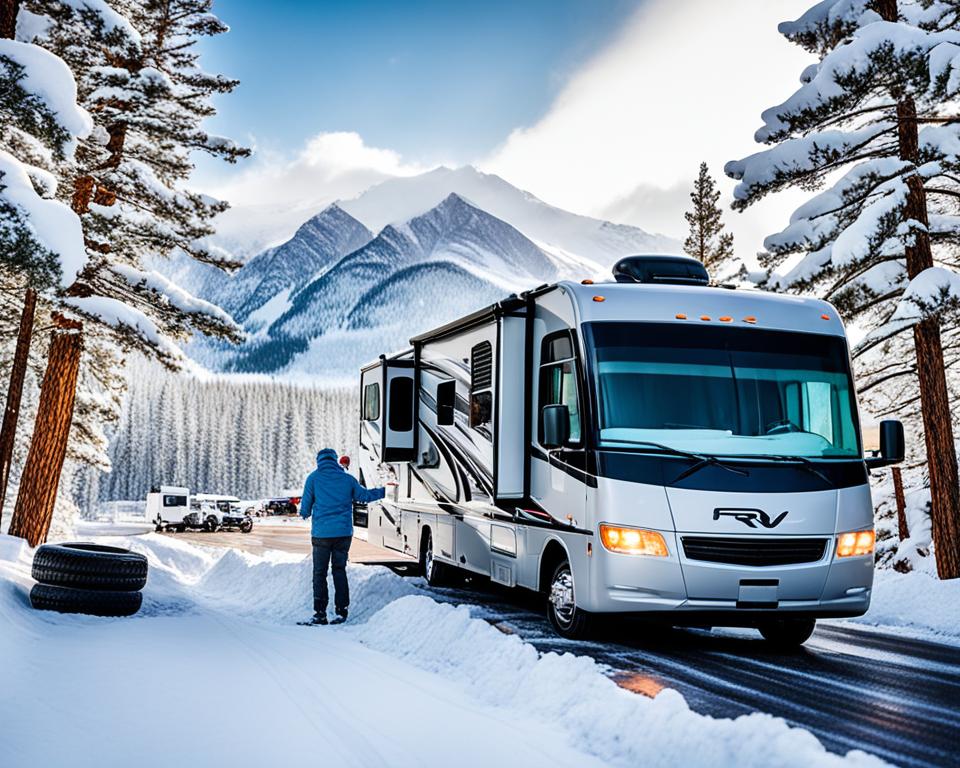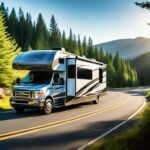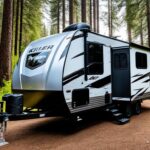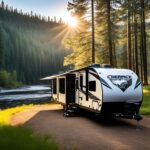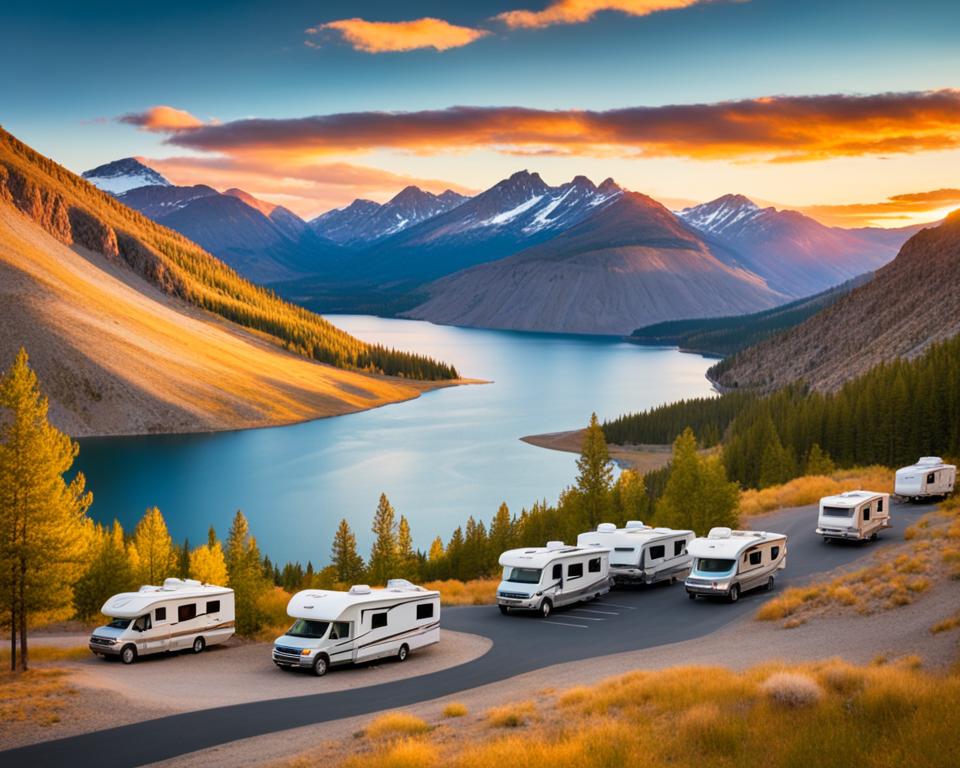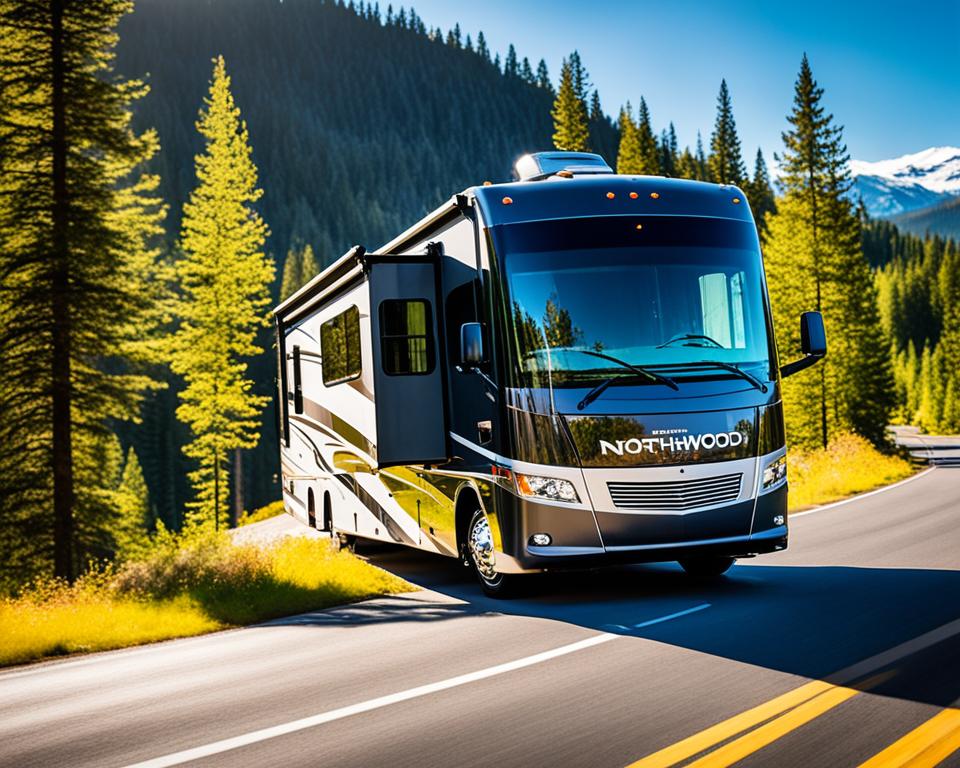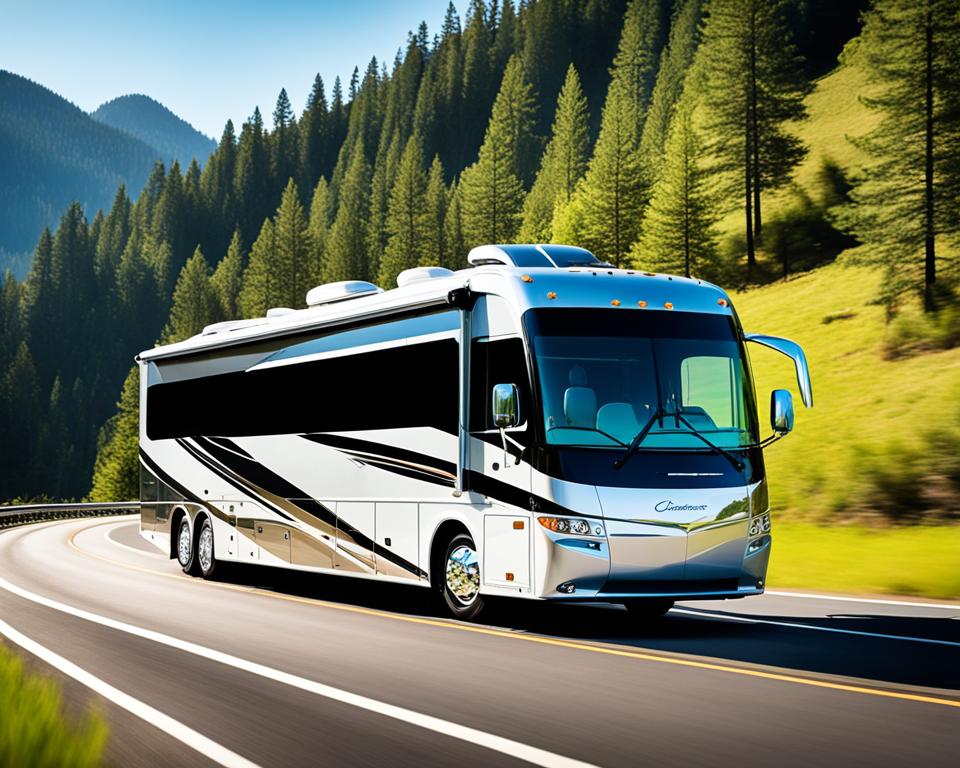RVing in extreme weather conditions can present challenges and potential risks. However, with the right preparation and knowledge, you can ensure a safe and enjoyable RVing experience, regardless of the weather forecast. This article provides valuable tips to help you survive and thrive while RVing in extreme weather.
Key Takeaways:
- Stay informed about current and future weather conditions using reliable sources.
- Consider repositioning your RV to minimize the impact of strong winds.
- Choose campgrounds or boondocking based on their safety advantages during extreme weather.
- Plan an escape route in case of severe weather and use GPS navigation for real-time updates.
- Ensure your RV’s batteries, tanks, and systems are well-maintained before extreme weather hits.
Stay Weather Aware
When RVing in extreme weather conditions, it is crucial to stay informed about current and upcoming weather conditions. By using RV weather apps or other reliable sources, you can regularly check the weather forecast and receive up-to-date information. Staying weather aware allows you to make necessary adjustments to your travel plans and ensure your safety on the road.
One valuable tool for staying informed is an RV weather app. These apps provide you with detailed weather forecasts specifically tailored for RVers. They offer features such as real-time updates, severe weather alerts, and road condition information that can help you plan your travels accordingly. Whether you’re expecting heavy rain, high winds, or even the possibility of tornadoes, an RV weather app can provide you with the crucial information you need to make informed decisions.
“Using an RV weather app has been a game-changer for me. It gives me peace of mind knowing that I can check the forecast and receive severe weather alerts right on my phone. It has helped me avoid dangerous situations and make smarter travel decisions.” – Emily, experienced RVer
In addition to RV weather apps, you can also rely on other reliable sources for weather forecasts. Check the forecasts provided by reputable meteorological websites or TV stations. These sources often offer detailed hourly and daily forecasts, as well as radar images and storm tracking, providing you with a comprehensive understanding of the weather conditions in your area.
By staying weather aware and keeping track of the forecast, you can ensure that you are prepared for any weather challenges you may encounter during your RVing adventures.
Benefits of Staying Weather Aware
There are several benefits to staying weather aware while RVing in extreme weather conditions:
- Early warning of severe weather events: By regularly checking the weather forecast, you can receive early warnings about severe weather events, such as thunderstorms, hurricanes, or blizzards. This gives you time to prepare and take necessary precautions.
- Adjusting travel plans: Knowing the weather conditions allows you to adjust your travel plans accordingly. You can choose to delay your departure, take alternative routes, or seek shelter if necessary.
- Minimizing risks: Being aware of the weather conditions helps you minimize the risks associated with extreme weather. You can avoid driving in dangerous conditions, such as heavy rain or high winds, reducing the likelihood of accidents or damage to your RV.
- Knowing when to seek shelter: Severe weather alerts can help you determine when it’s time to seek shelter or evacuate to a safer location. By staying informed, you can make timely decisions to protect yourself and your RV.
Top RV Weather Apps
| RV Weather App | Features | Compatible Platforms |
|---|---|---|
| RV LIFE | – Real-time weather data – Severe weather alerts – Customized RV trip planning |
iOS, Android |
| WeatherBug | – Hourly, daily, and weekly forecasts – Real-time lightning alerts – Road conditions and traffic updates |
iOS, Android |
| The Weather Channel | – Hourly and 10-day forecasts – Interactive radar maps – Severe weather alerts |
iOS, Android |
Note: The information provided in the table is for illustrative purposes only. Please check the respective app stores or official websites for the most up-to-date features and compatibility information.
Reposition Your Vehicle
When facing extreme weather conditions, it’s important to adjust the position of your RV to enhance its resistance to the elements. By making strategic positioning changes, you can better protect your RV from the potential hazards that come with bad weather.
One effective way to reposition your vehicle is to face it into the wind. By doing so, you minimize the RV’s profile, reducing the impact of strong gusts and preventing unnecessary strain on the structure. This simple adjustment can significantly improve the stability of your RV during high winds, ensuring a safer experience.
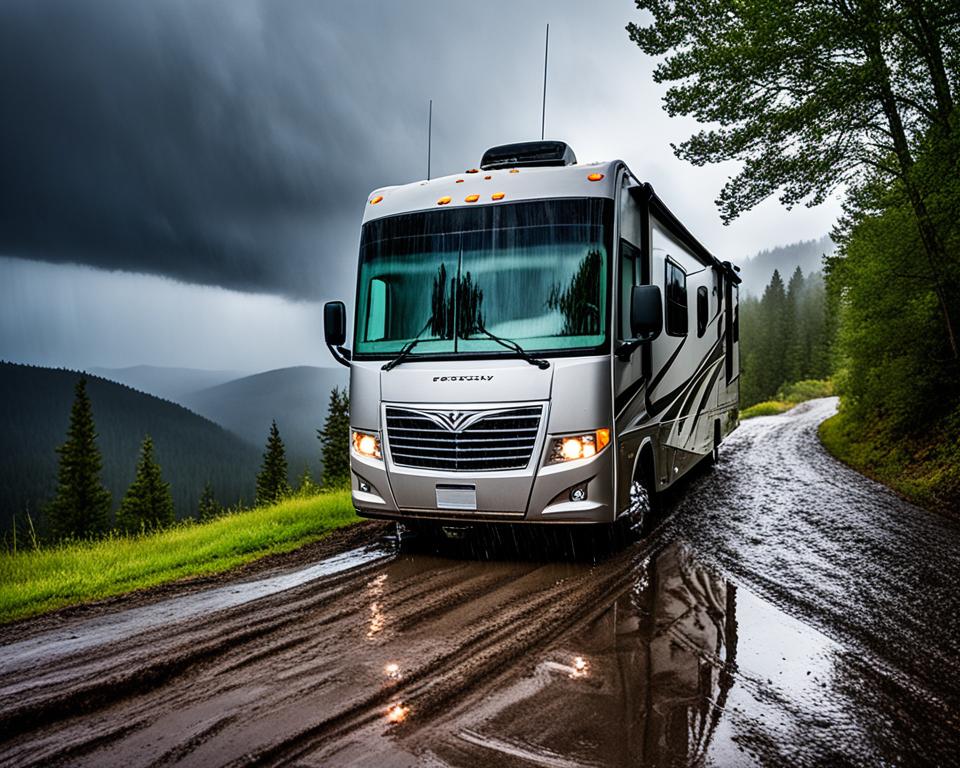
In addition to wind positioning, another consideration is finding suitable shade to park under during hot weather. Parking your RV under trees can provide natural shading, helping to keep the interior temperature cooler. Not only does this create a more comfortable environment, but it also reduces the strain on your RV’s cooling systems, extending their lifespan.
However, it’s crucial to exercise caution when choosing a parking spot during violent storms or blizzards. Falling branches or trees can pose significant dangers to your RV, causing severe damage. Prioritize safety above all else and seek alternative options that minimize the risks associated with falling debris.
Campgrounds vs. Boondocking
When it comes to RVing in extreme weather conditions, choosing between staying in a campground or boondocking can significantly impact your safety. Each option offers unique advantages and potential risks that you should carefully consider when planning your RVing trip in extreme weather.
The Benefits of Campgrounds
If you decide to stay in campgrounds during extreme weather, you’ll have the advantage of closer proximity to other RVers. This can be beneficial in case of emergencies or if you need assistance. Campgrounds also provide access to roads and nearby towns, which can be crucial for evacuation purposes. Additionally, campgrounds often have amenities such as storm shelters or community rooms that can offer added protection during severe weather events.
The Flexibility of Boondocking
On the other hand, boondocking allows for more flexibility in repositioning your RV to seek shelter using natural features. For example, if you encounter high winds, you can find a natural windbreak such as a hill or large trees to park behind, minimizing the impact of strong gusts. Boondocking also offers the freedom to choose secluded locations, reducing the likelihood of being affected by crowds or congestion during extreme weather.
However, it’s important to note that boondocking poses its own set of challenges and risks. Remote locations may have limited accessibility and resources, making it more difficult to seek assistance or find shelter in case of emergencies.
The Verdict
Ultimately, the choice between campgrounds and boondocking depends on your specific needs and circumstances. If safety and access to amenities are your top priorities, staying in campgrounds may be the better option. However, if you value flexibility and self-reliance, boondocking offers more freedom to adapt to extreme weather conditions.
| Campgrounds | Boondocking | |
|---|---|---|
| Proximity to other RVers | ✔️ | ❌ |
| Access to roads and nearby towns | ✔️ | ❌ |
| Availability of amenities | ✔️ | ❌ |
| Flexibility in repositioning RV | ❌ | ✔️ |
| Self-reliance | ❌ | ✔️ |
Regardless of your choice, it’s crucial to stay informed about the weather conditions and have a plan in place for seeking shelter or evacuation if necessary. Prioritize your safety and make decisions that align with your comfort level and experience as an RVer.
Next, in section 5, we’ll discuss the importance of plotting an escape route and utilizing RV GPS navigators.
Plot an Escape Route
In the event of severe weather, having a well-planned escape route is crucial for your safety. It’s important to know the best routes to safe locations for your RV evacuation. Utilize RV GPS navigators or smartphone map apps to guide you through the process.
RV GPS navigators are specifically designed to assist RVers in finding the most suitable routes. These devices provide real-time traffic information, alternate routes, and alerts for road closures or hazards. By using an RV GPS navigator, you can ensure that you are taking the most efficient and safe path to your destination.
Alternatively, you can use smartphone map apps, such as Google Maps or Apple Maps, which also offer features tailored for RVing. These apps provide voice-guided navigation, live traffic updates, and the ability to customize your route based on your RV’s specifications.
By knowing your escape route ahead of time, you can save valuable time during an emergency and evacuate quickly and safely. Be sure to check for any road closures or severe weather warnings along the way, as staying informed is crucial for a successful evacuation.
Benefits of RV GPS Navigators and Smartphone Map Apps:
- Real-time Traffic Information: Stay updated on traffic conditions, delays, and accidents to avoid congested areas.
- Alternate Routes: Find alternative paths when faced with road closures or traffic jams.
- Alerts for Road Closures or Hazards: Receive timely notifications about road closures, accidents, or other potential hazards along your route.
- Customization for RV Specifications: Tailor your route according to your RV’s height, weight, and length restrictions to avoid low bridges, narrow roads, or restricted areas.
Remember, safety should always be a top priority when RVing, especially during extreme weather conditions. Having a reliable escape route planned with the help of RV GPS navigators or smartphone map apps can make a significant difference in your ability to evacuate efficiently and securely.
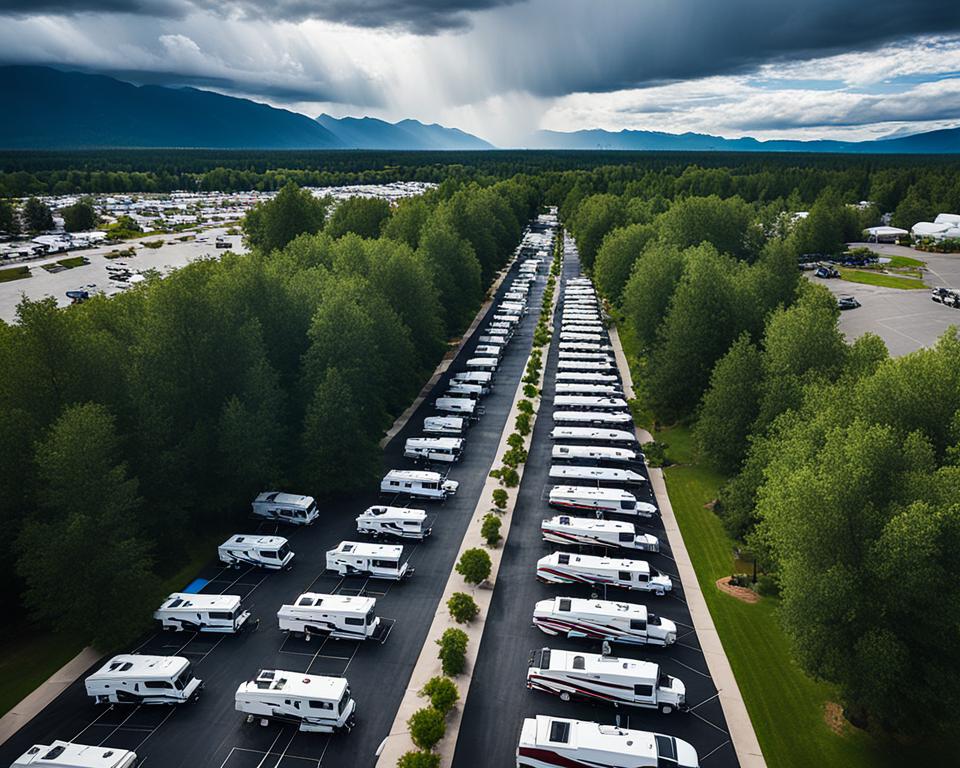
Charge Batteries and Maintain Your Tanks
Before extreme weather hits, it is essential to ensure that your RV’s house batteries are fully charged. This will provide you with a reliable power source during and after the storm. Keeping your batteries charged is crucial for operating vital systems such as lights, appliances, and communication devices. By taking this simple step, you can avoid unexpected power outages and stay comfortable and connected in your RV.
In addition to battery charging, proper maintenance of your grey and black water tanks is essential to ensure a smooth experience during extreme weather conditions. Before the storm arrives, it is advisable to empty your tanks to create additional capacity. This extra space can be valuable if you need to spend extra days in your RV due to severe weather or travel disruptions. Regularly emptying your tanks also helps prevent undesirable odors and keeps your RV clean and sanitary.
Grey Water Tank Maintenance Tips:
- Regularly empty your grey water tank to avoid backups and unpleasant odors.
- Use environmentally-friendly tank treatments to break down waste and control odors.
- Flush the tank thoroughly with clean water after each use to remove any residue.
- Check for leaks or damages in the tank and repair them promptly.
Black Water Tank Maintenance Tips:
- Empty your black water tank regularly to prevent clogs and maintain proper functionality.
- Use appropriate RV toilet paper to minimize the risk of tank clogging.
- Flush the tank thoroughly after each use to ensure it is clean and odor-free.
- Consider using black water tank cleaning solutions to break down waste and control odors.
Furthermore, it is crucial to regularly check the fuel levels in your propane tanks and generator. Propane is commonly used for cooking, heating, and powering various appliances in an RV. By ensuring that your propane tanks are adequately filled, you can avoid running out of gas during major weather events. Additionally, don’t forget to keep your RV’s fuel tank filled to an appropriate level, as it serves as a vital resource for your mobility and power supply.
By following these tips for RV battery charging and tank maintenance, you can stay well-prepared and minimize potential issues during extreme weather conditions. Keeping your batteries charged, maintaining your grey and black water tanks, and checking fuel levels are all crucial steps towards a safe and comfortable RVing experience, no matter the conditions.
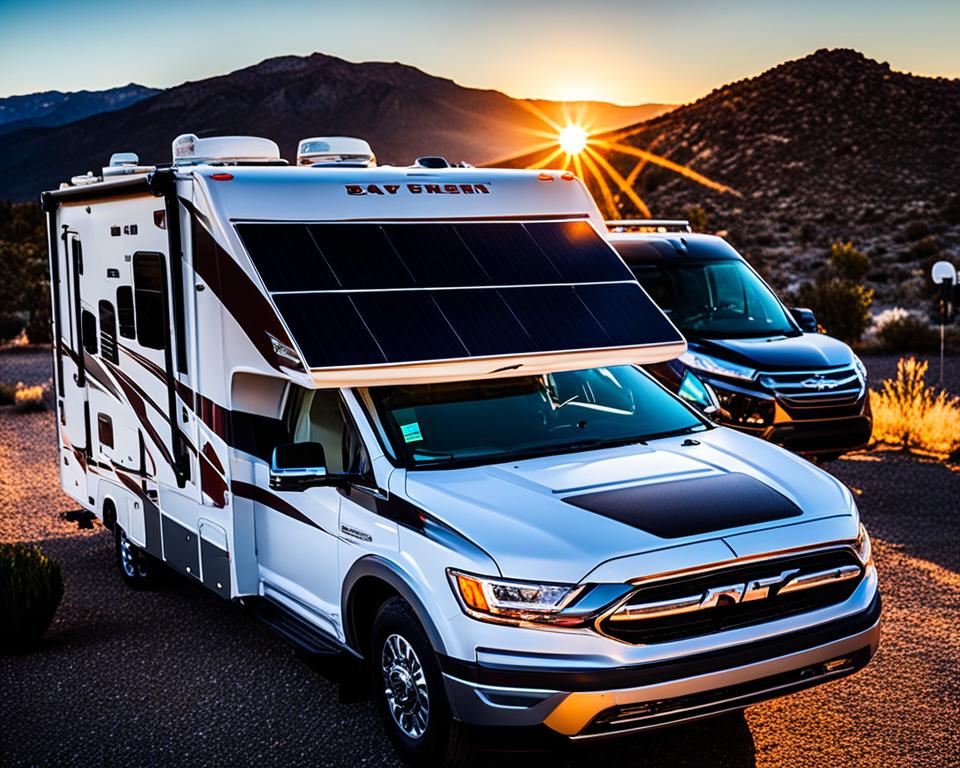
Keep Your RV Well Maintained
Regular RV maintenance is crucial for safe RVing in extreme weather conditions. By keeping your RV in optimal condition, you can minimize the risk of encountering problems during severe weather. Here are some essential maintenance tasks to prioritize:
Inspect Your RV’s Roof and Tires
Regularly inspecting your RV’s roof is essential to identify any wear and tear that could lead to water leaks. Check for any cracks, loose seams, or damaged roof materials. Addressing these issues promptly will help prevent water damage during heavy rain or snowstorms.
In addition to roof inspections, regularly check the condition of your RV’s tires. Proper tire maintenance is crucial for safe RVing in extreme weather conditions. Make sure the tires have sufficient tread depth, and check for any signs of damage or uneven wear. Maintaining proper tire pressure is also important, as it improves traction and overall handling, especially in slippery conditions.
Maintain Your HVAC and Electrical Systems
Your RV’s HVAC (Heating, Ventilation, and Air Conditioning) system plays a vital role in keeping you comfortable during extreme weather. Schedule regular maintenance checks to ensure that your HVAC system is functioning properly. Clean or replace air filters as needed to maintain optimal airflow and prevent system malfunctions.
The electrical system is another critical component of your RV. Inspect and test all electrical connections, outlets, and appliances regularly. Look for any signs of frayed wires, loose connections, or malfunctioning components. Addressing these issues promptly will help prevent electrical problems that can compromise your safety during severe weather.
“Regularly inspecting your RV’s roof and tires, and maintaining your HVAC and electrical systems will ensure your RV is in optimal condition to withstand extreme weather.”
RV Maintenance Checklist
| Task | Frequency |
|---|---|
| Inspect the roof for wear and tear | Every 3 months |
| Check tire tread depth and condition | Before every trip |
| Maintain proper tire pressure | Monthly |
| Clean or replace HVAC system air filters | Every 3 months |
| Inspect electrical connections and appliances | Annually |
Regular maintenance is essential for safe RVing in extreme weather conditions. By inspecting your RV’s roof and tires, as well as maintaining your HVAC and electrical systems, you can ensure your RV is well-prepared to handle severe weather. Stay proactive and address any issues promptly to minimize the risks associated with extreme weather.
Carry Emergency Supplies and Equipment
When venturing into extreme weather conditions with your RV, it is crucial to be well-prepared for any unexpected situations that may arise. Carrying an emergency preparedness kit and essential supplies can make a significant difference in ensuring your safety and peace of mind. Here are some essential items to include in your RV emergency preparedness kit:
1. First Aid Kit
An all-encompassing first aid kit is essential for addressing minor injuries and providing temporary medical relief until professional help is available.
2. Water and Nonperishable Food
Stock up on an ample supply of drinking water and nonperishable food items to sustain you during emergencies or when access to supplies may be limited.
3. Flashlight and Batteries
A reliable flashlight and extra batteries are essential for navigating through darkness or during power outages.
4. Power Bank
A portable power bank ensures that you have a backup power source to keep your electronic devices charged and connected in case of emergencies.
5. Pocket Multitool
A pocket multitool can come in handy for various tasks, including minor repairs and quick adjustments.
6. Rain Ponchos
Stay dry and protected from the elements with rain ponchos, which are lightweight and easily portable.
7. Weather Radio
A weather radio is an invaluable tool for staying informed about severe weather updates, alerts, and instructions from local authorities.
In addition to the emergency kit, it is essential to have roadside safety equipment readily available in your RV. These items can help you address roadside emergencies and ensure your safety:
1. Jumper Cables
Jumper cables are essential for jump-starting your RV’s battery or lending a helping hand to fellow RVers in need.
2. Flares
Flares can help signal for assistance and warn other drivers of potential hazards on the road.
3. Tow Straps
Tow straps are useful for vehicle recovery and towing in case of breakdowns or accidents.
4. Fire Extinguisher
Having a fire extinguisher in your RV can help you quickly contain and extinguish small fires before they escalate.
By being prepared with the necessary supplies, equipment, and safety gear, you can ensure that you are ready for any extreme weather event or roadside emergency that may come your way. Prioritize your safety and the safety of your fellow RVers by taking the time to gather these essential items for your RV. Remember, being prepared can make all the difference in enjoying a safe and enjoyable RVing experience even in the face of challenging weather conditions.
Be Prepared to Relocate
In some cases, it may be necessary to relocate your RV during extreme weather to ensure your safety. When facing blizzards, heavy rains, or destructive winds, flexible travel plans become essential. Prioritizing safety means being prepared to change your itinerary and seek safer destinations.
By avoiding extreme weather conditions altogether, you can minimize the risks associated with RVing in such circumstances. Stay informed about weather forecasts and be ready to point your vehicle in a new direction if needed.
When planning your RVing adventure, consider the following:
- Research and identify regions with more favorable weather conditions during your travel period.
- Stay updated with the latest weather reports to anticipate potential dangers along your route.
- Communicate and collaborate with other RVers or local authorities for valuable insights and advice regarding safer destinations.
By understanding when and where extreme weather is likely to occur, you can proactively adjust your travel plans to avoid dangerous situations. This flexibility will enable you to enjoy your RVing experience while prioritizing your safety and well-being.
Benefits of Relocating During Extreme Weather
Relocating your RV during extreme weather can bring several benefits, including:
- Minimizing the risk of damage to your RV: By seeking safer destinations, you can avoid potential hazards such as falling branches, debris, or flooding that may cause harm to your vehicle.
- Ensuring your personal safety: Moving away from areas affected by extreme weather reduces the risk of injury to yourself and your fellow travelers.
- Maintaining peace of mind: Choosing to relocate provides a sense of security and peace, knowing that you have taken proactive steps to mitigate risks and prioritize safety.
| Extreme Weather Type | Safer Relocation Destinations |
|---|---|
| Blizzards | Lower elevations or regions unaffected by heavy snowfall |
| Heavy Rains | Dry and elevated areas to avoid flooding |
| Destructive Winds | Protected areas shielded by natural features such as hills or mountains |
Remember, being prepared to relocate and adjusting your travel plans is crucial for staying safe during extreme weather. Your willingness to adapt and seek safer destinations will ensure a more enjoyable and secure RVing experience.
Avoid Unsafe RV Shelters
During extreme weather, it is essential to prioritize RV safety and avoid using your motorhome or travel trailer as a shelter. These vehicles are not designed to withstand severe weather conditions such as tornadoes, blizzards, or hurricanes. Instead, it’s important to seek refuge in more secure and permanent structures that can provide better protection.
Familiarize yourself with campsite evacuation procedures so that you know the steps to take in case of an emergency. Additionally, identify nearby permanent structures such as bathhouses or community rooms that can serve as safe havens during extreme weather events.
If you’re driving and find yourself caught in severe weather, don’t attempt to ride it out in your RV. Instead, locate the nearest exit and seek shelter in a public, permanent structure like a gas station or restaurant. These buildings offer more robust construction and safety features that can better withstand harsh conditions.
- Do not use your RV as a shelter during extreme weather.
- Familiarize yourself with campsite evacuation procedures.
- Seek out nearby permanent structures for better protection.
- If driving, locate the nearest exit and take shelter in a public, permanent structure.
By following these precautions, you can prioritize your safety and minimize the risks associated with severe weather conditions while RVing.
Conclusion
RVing in extreme weather conditions requires careful planning and preparation to ensure a safe and enjoyable experience. By following these tips, RVers can confidently navigate through any bad weather and stay safe on the road.
Firstly, staying informed about the weather forecast is crucial. Utilize RV weather apps or reliable sources to regularly check the conditions and receive real-time updates. This will help you make adjustments to your travel plans and stay ahead of any severe weather events.
Repositioning your RV when necessary is another important aspect of RVing in extreme weather. Positioning your vehicle to face the wind can minimize the impact of strong gusts, while parking under trees can provide shade in hot weather. However, be cautious in violent storms or blizzards to avoid any potential hazards.
Additionally, being prepared with essential supplies and equipment is essential. Carry an emergency preparedness kit that includes items such as first aid supplies, nonperishable food, flashlight, and a weather radio. Also, make sure your RV is well-maintained and equipped with roadside safety tools such as jumper cables and tow straps.
By prioritizing safety, staying informed, repositioning as needed, and being prepared, RVers can confidently navigate through extreme weather conditions. With these tips, you can enjoy your RVing adventures while ensuring the well-being of yourself and your fellow travelers.
FAQ
What should I do to stay safe while RVing in extreme weather conditions?
To stay safe while RVing in extreme weather conditions, it is important to stay informed about current and future weather conditions, adjust the position of your RV to better withstand the elements, choose the right camping option (campground or boondocking), have an escape route planned, ensure your RV is properly prepared and maintained, carry an emergency preparedness kit, be prepared to relocate if necessary, and avoid using your RV as a shelter during severe weather.
How can I stay weather aware when RVing in extreme weather?
To stay weather aware when RVing in extreme weather, use smartphone weather apps or other reliable sources to regularly check the forecast and receive up-to-date information. Being aware of the weather conditions will allow you to make necessary adjustments to your travel plans and stay safe.
Should I reposition my RV during extreme weather?
Depending on the weather conditions, it may be necessary to reposition your RV to better withstand the elements. For example, positioning your RV to face the wind reduces its profile and minimizes the impact of strong gusts. Additionally, parking under trees can provide shade and help keep the interior temperature cooler in hot weather. However, be cautious in violent storms or blizzards, as falling branches or trees can cause significant damage.
Should I choose a campground or boondocking during extreme weather?
The choice between staying in a campground or boondocking can affect your safety during extreme weather events. Campgrounds often provide closer proximity to other RVers and access to roads and nearby towns for assistance or evacuation. On the other hand, boondocking allows more flexibility in repositioning your RV to seek shelter using natural features. Consider the advantages and potential risks of each option when planning your RVing trip in extreme weather conditions.
How can I plot an escape route during extreme weather?
Before extreme weather hits, ensure that you have an escape route planned in case of severe weather. Use RV GPS navigators or smartphone map apps to find the best routes to safe locations. These devices can provide real-time traffic information, alternate routes, and alerts for road closures or hazards. By knowing your escape route ahead of time, you can quickly and safely evacuate if necessary.
How should I prepare my RV for extreme weather?
Before extreme weather hits, ensure that your RV’s house batteries are fully charged to maintain power during and after the storm. It is also advisable to empty your grey and black water tanks to create additional capacity in case you need to spend extra days in your RV. Check the fuel levels in your propane tanks and generator, and make sure your RV’s fuel tank is filled to avoid running out of gas during major weather events.
How can I keep my RV well maintained for extreme weather?
Regular RV maintenance is crucial for safe RVing in extreme weather conditions. Inspect your RV’s roof for wear and tear that could lead to water leaks, and check the condition of your tires, brakes, and other equipment. Properly maintaining your appliances, HVAC, and electrical systems will reduce the chances of problems during severe weather. By staying on top of maintenance tasks, you can ensure your RV is in optimal condition to withstand extreme weather.
What should I carry in my RV for emergency situations during extreme weather?
Always carry an emergency preparedness kit in your RV to be ready for any extreme weather event. This kit should include essentials such as a first aid kit, water, nonperishable food, flashlight, power bank, pocket multitool, rain ponchos, and a weather radio. Additionally, make sure your RV is equipped with roadside safety equipment like jumper cables, flares, tow straps, and a fire extinguisher. Being prepared with the necessary supplies and equipment can make a significant difference in your safety during extreme weather.
Should I be prepared to relocate if needed during extreme weather?
In some cases, it may be necessary to relocate your RV during extreme weather to ensure your safety. Be flexible with your travel plans and willing to change your itinerary if the weather conditions become threatening. Avoiding blizzards, heavy rains, or destructive winds altogether is the best way to stay safe while RVing. Always prioritize your safety and be prepared to point your vehicle in a new direction if needed.
Can I use my RV as a shelter in extreme weather?
During extreme weather, it is essential to avoid using your RV as a shelter. Motorhomes and travel trailers are not designed to withstand severe weather conditions like tornadoes, blizzards, or hurricanes. Familiarize yourself with campsite evacuation procedures and nearby permanent structures that can provide better protection, such as bathhouses or community rooms. If driving, locate the nearest exit and seek shelter in a public, permanent structure like a gas station or restaurant.

